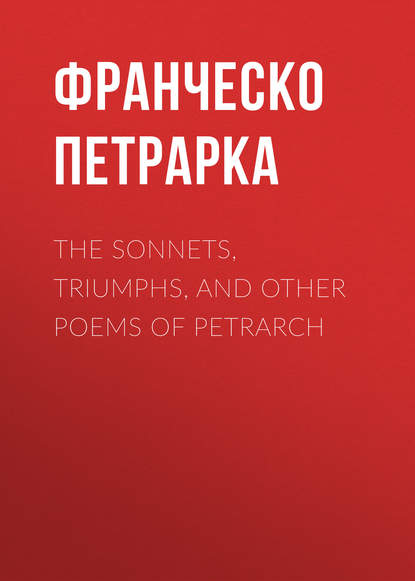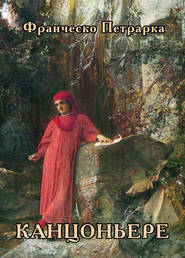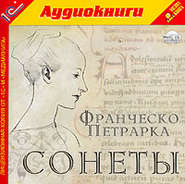По всем вопросам обращайтесь на: info@litportal.ru
(©) 2003-2025.
✖
The Sonnets, Triumphs, and Other Poems of Petrarch
Настройки чтения
Размер шрифта
Высота строк
Поля
Save when their ray is lost 'mid storms or rocks;
So I too from above the swollen sail
Saw the sure colours of that other life,
And could not help but sigh to reach my end.
Not that I yet am certain of that end,
For wishing with the dawn to be in port,
Is a long voyage for so short a life:
And then I fear to find me in frail bark,
Beyond my wishes full its every sail
With the strong wind which drove me on those rocks.
Escape I living from these doubtful rocks,
Or if my exile have but a fair end,
How happy shall I be to furl my sail,
And my last anchor cast in some sure port;
But, ah! I burn, and, as some blazing bark,
So hard to me to leave my wonted life.
Lord of my end and master of my life,
Before I lose my bark amid the rocks,
Direct to a good port its harass'd sail!
Macgregor.
SONNET LX
Io son sì stanco sotto 'l fascio antico
HE CONFESSES HIS ERRORS, AND THROWS HIMSELF ON THE MERCY OF GOD
Evil by custom, as by nature frail,
I am so wearied with the long disgrace,
That much I dread my fainting in the race
Should let th' original enemy prevail.
Once an Eternal Friend, that heard my cries,
Came to my rescue, glorious in his might,
Arm'd with all-conquering love, then took his flight,
That I in vain pursued Him with my eyes.
But his dear words, yet sounding, sweetly say,
"O ye that faint with travel, see the way!
Hopeless of other refuge, come to me."
What grace, what kindness, or what destiny
Will give me wings, as the fair-feather'd dove,
To raise me hence and seek my rest above?
Basil Kennet.
So weary am I 'neath the constant thrall
Of mine own vile heart, and the false world's taint,
That much I fear while on the way to faint,
And in the hands of my worst foe to fall.
Well came, ineffably, supremely kind,
A friend to free me from the guilty bond,
But too soon upward flew my sight beyond,
So that in vain I strive his track to find;
But still his words stamp'd on my heart remain,
All ye who labour, lo! the way in me;
Come unto me, nor let the world detain!
Oh! that to me, by grace divine, were given
Wings like a dove, then I away would flee,
And be at rest, up, up from earth to heaven!
Macgregor.
SONNET LXI
Io non fu' d' amar voi lassato unquanco
UNLESS LAURA RELENT, HE IS RESOLVED TO ABANDON HER
Yet was I never of your love aggrieved,
Nor never shall while that my life doth last:
But of hating myself, that date is past;
And tears continual sore have me wearied:
I will not yet in my grave be buried;
Nor on my tomb your name have fixèd fast,
As cruel cause, that did the spirit soon haste
From the unhappy bones, by great sighs stirr'd.
Then if a heart of amorous faith and will
Content your mind withouten doing grief;
Please it you so to this to do relief:
If otherwise you seek for to fulfil
Your wrath, you err, and shall not as you ween;
And you yourself the cause thereof have been.
Wyatt.
Weary I never was, nor can be e'er,
Lady, while life shall last, of loving you,
But brought, alas! myself in hate to view,
Perpetual tears have bred a blank despair:
I wish a tomb, whose marble fine and fair,
When this tired spirit and frail flesh are two,
May show your name, to which my death is due,
If e'en our names at last one stone may share;
Wherefore, if full of faith and love, a heart
Can, of worst torture short, suffice your hate,
Mercy at length may visit e'en my smart.
If otherwise your wrath itself would sate,
So I too from above the swollen sail
Saw the sure colours of that other life,
And could not help but sigh to reach my end.
Not that I yet am certain of that end,
For wishing with the dawn to be in port,
Is a long voyage for so short a life:
And then I fear to find me in frail bark,
Beyond my wishes full its every sail
With the strong wind which drove me on those rocks.
Escape I living from these doubtful rocks,
Or if my exile have but a fair end,
How happy shall I be to furl my sail,
And my last anchor cast in some sure port;
But, ah! I burn, and, as some blazing bark,
So hard to me to leave my wonted life.
Lord of my end and master of my life,
Before I lose my bark amid the rocks,
Direct to a good port its harass'd sail!
Macgregor.
SONNET LX
Io son sì stanco sotto 'l fascio antico
HE CONFESSES HIS ERRORS, AND THROWS HIMSELF ON THE MERCY OF GOD
Evil by custom, as by nature frail,
I am so wearied with the long disgrace,
That much I dread my fainting in the race
Should let th' original enemy prevail.
Once an Eternal Friend, that heard my cries,
Came to my rescue, glorious in his might,
Arm'd with all-conquering love, then took his flight,
That I in vain pursued Him with my eyes.
But his dear words, yet sounding, sweetly say,
"O ye that faint with travel, see the way!
Hopeless of other refuge, come to me."
What grace, what kindness, or what destiny
Will give me wings, as the fair-feather'd dove,
To raise me hence and seek my rest above?
Basil Kennet.
So weary am I 'neath the constant thrall
Of mine own vile heart, and the false world's taint,
That much I fear while on the way to faint,
And in the hands of my worst foe to fall.
Well came, ineffably, supremely kind,
A friend to free me from the guilty bond,
But too soon upward flew my sight beyond,
So that in vain I strive his track to find;
But still his words stamp'd on my heart remain,
All ye who labour, lo! the way in me;
Come unto me, nor let the world detain!
Oh! that to me, by grace divine, were given
Wings like a dove, then I away would flee,
And be at rest, up, up from earth to heaven!
Macgregor.
SONNET LXI
Io non fu' d' amar voi lassato unquanco
UNLESS LAURA RELENT, HE IS RESOLVED TO ABANDON HER
Yet was I never of your love aggrieved,
Nor never shall while that my life doth last:
But of hating myself, that date is past;
And tears continual sore have me wearied:
I will not yet in my grave be buried;
Nor on my tomb your name have fixèd fast,
As cruel cause, that did the spirit soon haste
From the unhappy bones, by great sighs stirr'd.
Then if a heart of amorous faith and will
Content your mind withouten doing grief;
Please it you so to this to do relief:
If otherwise you seek for to fulfil
Your wrath, you err, and shall not as you ween;
And you yourself the cause thereof have been.
Wyatt.
Weary I never was, nor can be e'er,
Lady, while life shall last, of loving you,
But brought, alas! myself in hate to view,
Perpetual tears have bred a blank despair:
I wish a tomb, whose marble fine and fair,
When this tired spirit and frail flesh are two,
May show your name, to which my death is due,
If e'en our names at last one stone may share;
Wherefore, if full of faith and love, a heart
Can, of worst torture short, suffice your hate,
Mercy at length may visit e'en my smart.
If otherwise your wrath itself would sate,














